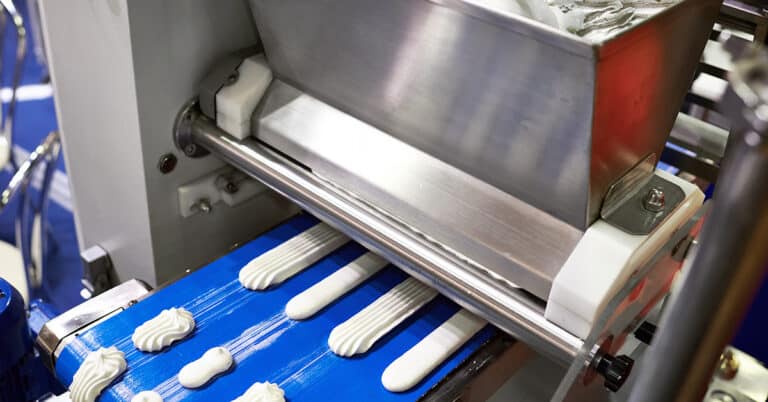In an industry such as manufacturing, where efficiency is constantly sought yet difficult to find, enterprise resource planning (ERP) can be a game-changer. Manufacturing ERP is a centralized method of managing every aspect of facility operations and processes, from production to payroll. ERP allows for unprecedented visibility, coordination and management across the disparate processes that make up a business — ultimately resulting in greater operational efficiency.
What is an ERP system in manufacturing?
In the simplest possible terms, manufacturing ERP software serves as the centralized hub through which all operations and processes within your facility can be observed. These platforms can consist of numerous applications that all share a common database and integrate with each other. With the advent of the Industrial Internet of Things (IIoT) and Industry 4.0 principles, the adoption of ERP in manufacturing takes on new dimensions. Now, smart equipment can communicate with the central ERP system to provide operators with real-time insights into their performance to make even better decisions. This means manufacturers can use their ERP platforms to streamline their maintenance, supply chain, quality assurance and more.
Manufacturing ERP: The “hows” and “whys”
ERP is a natural fit for the manufacturing sector, given the numerous processes that must occur every day just to keep a facility running. Some examples of processes that ERP can help manage and streamline are listed below — be sure to note the numerous ways in which these processes can now “talk” to each other via ERP in production, a major benefit that will be discussed further below.
- Inventory management: From MRO to equipment spares, ERP can act as a centralized resource for industrial asset management, data analysis and replenishment strategy.
- Supply chain: ERP enables visibility and organization for vendor performance tracking and can draw on data from internal and external sources in order to assist with more efficient supply chain planning and management.
- Maintenance: Manufacturing ERP software facilitates effective maintenance by centralizing scheduling, ticketing and work order management, while also enabling powerful data tracking and analytics to improve maintenance effectiveness.
- Equipment performance tracking: ERP modules can store, track and analyze equipment performance data from sensors and reports, enabling more informed, proactive, targeted maintenance.
- Quality assurance: Enterprise resource planning software can track QA results, creating vast data stores over time that can play a role in early identification of maintenance needs.
- Purchasing: With ERP, purchasing and requisition can be easily organized and can operate with visibility into other relevant areas of the operation.
- HR: In addition to manufacturing operations and support, ERP can also be applied to HR functions such as performance reviews, goal tracking and more.
- Artificial intelligence: The use of AI for ERP systems allows manufacturers to automate many tasks, improve their data processing and refine their analysis. The result is a smoother, more efficient system that makes it easier for companies to experience the benefits of ERP in manufacturing.
- Cloud connectivity: By connecting ERP systems for manufacturing within the cloud, manufacturers can continue to make adjustments on the fly across the entire lifecycle of a product, even with multiple facilities and teams involved.
- Enhanced decision making: Manufacturing enterprise resource planning software provides real-time data and analytics that give you all the information you need to make better-informed decisions.
- Improved efficiency: With ERP in the manufacturing industry, you can streamline processes, reduce the amount of manual labor for your team and enhance productivity across the board.
Now that you understand the “hows” of ERP’s impact, let’s look at the “whys” — the benefits of implementing an ERP project.
- Increased visibility into processes: ERP acts as a centralized, accessible “single source of truth” for every process in the system. Anyone can access information from any other process or department, which makes it much easier to foster coordination, collaboration and — as discussed below — communication to introduce benefits and innovations.
- Communication between different departments: With increased visibility across functions and processes comes the breakdown of barriers to communication. Process “silos” — the invisible (or actual) “walls” between different groups and functions — can result in redundant work, inefficiencies and missed opportunities for collaboration. ERP solves these problems through open channels and transparency.
- Centralized data collection and analysis: From machine sensors to QA tracking and more, ERP facilitates the modern, data-focused facility and all the benefits that this unprecedented amount of information and insight affords. Data analysis can drive more informed, effective decision-making in areas such as maintenance, machine usage, procurement, supply chain and more.
- Greater efficiency in processes: Over time, as more data is collected and personnel grows accustomed to the increased visibility provided by ERP, processes will become streamlined, cross-functional efficiencies will be identified and productivity will increase.
- Overall cost reductions: With the above benefits come cost reductions and efficiencies — one of the primary ultimate benefits of investing in ERP software for manufacturing.
- Design and engineering: Manufacturing ERP systems help facilitate better collaboration between design and engineering teams, resulting in a better finished product and fewer defects discovered during production. This is essential for quality assurance and keeping costs from getting out of control.
- Financial management and MRP: Material requirements planning (MRP) is a system for tracking materials and supplies in a facility. Although there are many differences between MRP and ERP systems, ERP for the manufacturing industry can integrate with MRP and financial management modules to make keeping tabs on resources much more manageable.
How to know when your facility needs an ERP system
There are a number of key indicators that may suggest your facility needs to implement manufacturing ERP software. The most prominent of these include:
- Data silos: When different departments each use their own separate software systems, it can lead to fragmented data and poor communication. Implementing ERP solutions for manufacturing gives everyone a common platform for streamlined sharing of information.
- Inefficient manual processes: Using manual processes for crucial business functions such as inventory management or accounting increases the risk of delays or errors. An ERP platform can bring greater efficiency and accuracy to these tasks.
- Poor visibility: If your business has trouble tracking key performance metrics, you may have the need for an ERP system to deliver these insights on a regular basis.
- Rapid growth: When you expand to keep up with demand, an industrial ERP platform can provide you with scalability to help you maintain your momentum.
Industry-specific ERP benefits for manufacturing
- Automotive: ERP software for manufacturers in the automotive sector can help them manage their extremely complex supply chains while also facilitating just-in-time production.
- Aerospace: This sector has some very strict regulatory requirements, and an ERP system can make sure there are no oversights that could lead to costly compliance issues.
- Pharmaceuticals: By tracking batch numbers and other areas critical to FDA compliance, ERP systems can deliver significant benefits to pharma companies.
- Consumer packaged goods: Using ERP gives manufacturers in this sector the ability to manage high-volume production, packaging and distribution while also tracking shelf life and ensuring quality control.
Challenges in implementing ERP systems
The key to successful ERP implementation in the manufacturing industry is being able to anticipate and overcome the most common stumbling blocks you may face. These can include, but are not limited to:
- Resistance to change: Companies with well-established protocols and procedures may find transitioning to a new system difficult. There may be reluctance to make the switch, and trouble getting everyone up to speed with a digital workflow compared to manual processes.
- Integration with legacy systems: If you’re expecting a plug-and-play experience, you may find that ERP doesn’t integrate as easily with your existing legacy systems or software.
- Cost of implementation: As might be expected for such a comprehensive and robust solution, an ERP system can be a significant financial investment. This is especially true for smaller manufacturers with limited resources.
Fortunately, there are a number of strategies that can help you mitigate these challenges and start realizing the advantages of ERP. For example, you can initiate a phased rollout, which can help keep costs manageable and provide enough time to troubleshoot any difficult integrations. Instituting a proper training program for the software also helps employees et up to speed on these systems.
Using enterprise resource planning for manufacturing can make many processes much easier, including maintenance planning, scheduling and strategy. At ATS, one of our core missions is to help manufacturers take advantage of data-driven technologies such as ERP and CMMS to keep plant operations up and running while continuously improving. To learn more about industrial maintenance and MRO asset management solutions from ATS, contact us today.






